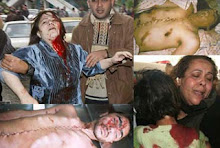Singkatan;IKRAR (Ikatan Kebajikan Rakyat)
18 febr
Barghouhti: Israel should pay compensations for the huge damage in Gaza

MP Mustafa Al-Barghouthi, the secretary general of the national initiative, said that Israel should not be allowed to escape responsibility for the vast destruction it inflicted on Gaza Strip during its three-week blitzkrieg.
Barghouthi in a statement on Sunday called on all concerned, official parties to immediately start filing lawsuits against the Israeli government to force to it pay compensation for the human casualties and material damage.
He said that the investigations, including those of the Israeli army, proved that the huge devastation was not "legally or ethically justified".
The MP expressed regret that the UN Secretary General Ban Ki-moon retreated over his previous stands on formation of a neutral international committee to probe Israel"s war crimes including the shelling of UN agencies in Gaza.
"Without such procedures there is no guarantee that the Zionist entity would not repeat such crimes," he warned.
Barghouti said that he was participating in an international campaign to impose sanctions on Israel similar to those imposed previously on South Africa during the rule of the apartheid regime.

According to Hamdan, when reading the Israeli elections, three points is required to be analyzed.
Palestinians win in the Palestinian territories for the first time
Gaza truce with Egyptian mediation
The Palestanian National Dialogue
International forces problem in Gaza
Current status of the Palestanian refugee camps in Lebanon
urkey condemns Israel over recent comments

rkey and the Palestinian Question

Turkish Diplomacy after the Gaza Tragedy
SETA Foundation for Political, Economic and Social Research
[*] Professor of International Relations, Işık University, abulent@isikun.edu.tr
Prime Minister"s Speech, 28 February 2006, www.basbakanlik.gov.tr
See http://news.bbc.co.uk/1/hi/world/europe/1911609.stm.
See http://rferl.org/featuresarticle/2004/06/2dcae3ab-d364-452a-85f5-428c2f757fa9.html?napage_3.
See http://english.aljazeera.net/NR/exeres/8395C7CE-AEAC-4CF9-8319-B7F5C6AD0DCF.htm
TOBB-BIS, Baris Icin Sanayi Girisimi: Kavramsal Cerceve, (Ankara: TEPAV, 2006).
See http://www.radikal.com.tr/haber.php?haberno_191398
See http://www.tepav.org.tr/engyeni/admin/dosyabul/upload/Joint_Declaration.pdf
For more information, see www.tobb.org.tr/haber_arsiv2.php?haberid_1170.
Fikret Bila, "HamasHamasHamas"in Ankara Ziyaretinin Hassas Yonleri,"Milliyet, 17 February 2006
Yasemin Congar, "Mesal, Esad, Bush, Erdogan,"Milliyet, 3 July 2006
Guneri Civaoglu, "Erken Depar,"Milliyet, 21 February 2006
Taha Akyol, "HamasHamasHamas ve Turkiye,"Milliyet, 18 February 2006
Sezai Kalayci, "Ambargo Baris Getirmez,"Zaman, 13 April 2006
Bulent Aras and Salih Bıcakci, ""Turkey, EU and the Middle East: Is Harmonisation Possible" East European Quarterly, 40 (3), September 2006: 367-381
Ibid
Cengiz Candar, "Erdogan"in Ortadogu Turu,"Radikal, 3 December 2009
Star, 28 December 2008
See http://www.oic-oci.org, 03 January 2009
"Turkish premier calls on international community to take action for Gaza,"Today"s Zaman, 4 January 2009
"Gul Peres ile Gorustu,"Sabah, 31 December 2008
"30 Aralık 2008 Tarihli MGK Toplantisinin Basin Bildirisi,"at http://www.mgk.gov.tr/Turkce/basinbildiri2008/30aralik2008.html
Al Dustur, 30 December 2008; Al Safir, 1 January 2009; Daily Star, 2 January 2009


.jpg)













No comments:
Post a Comment
silakan komen dan beri pandangan anda untuk kebaikan semua!!